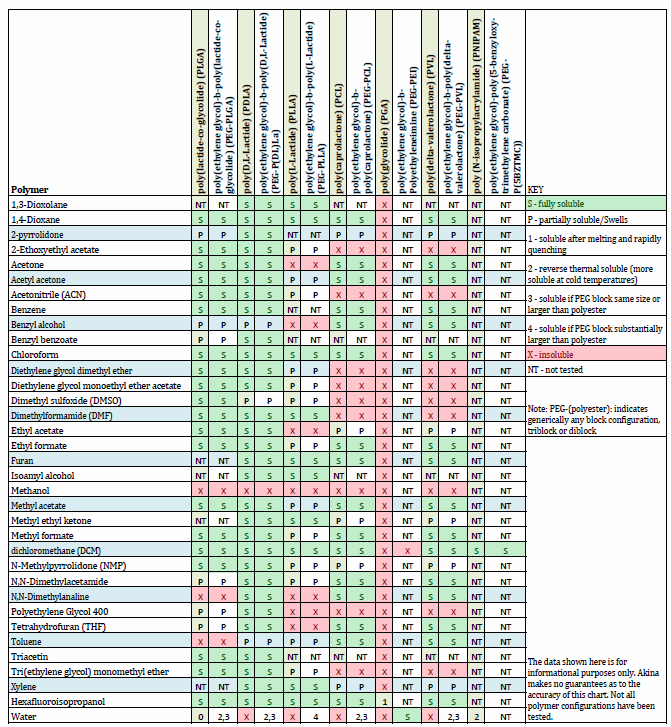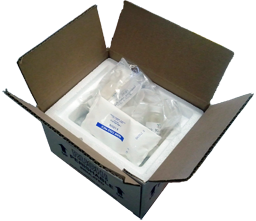Applications
Nano-immunotherapy: Use of polymers in immunotherapy by delivery of biologicals as a treatment for cancer and other diseases. (1, 2)
Stem-Cell tissue engineering: Use of 3DCellMaker as well as other polymers for stem-cell growth and development.
3D-gelprinting or bioprinting: Use of thermogels for bioprinting applications. (1)
Other Applications: others
Categories
Block Copolymers
Biodegradable hydrophilic block copolymers. These polymers are block copolymers of hydrophillic, biocompatible poly(ethylene glycol) (PEG), and biodegradable polymers such as poly(lactide-co-glycolide) (PLGA), poly(caprolactone) (PCL), and poly(lactide) (PLA).
Ideal for delivery of poorly soluble drugs such as paclitaxel. PolyVivo polymers can be used for a wide variety of drug delivery platforms, including polymer micelles, thermoreversable hydrogels and other formulations.
Intermediates
Contain reactive or activatable groups for you to customize for your application. Have a specific ligand you want to try out? Have a new targeting strategy? Bring your ideas to the benchtop and animal models quickly by starting with one of Akina's intermediates.
Modified PEGs
Polymers built with polyethylene glycol.
Monomers
Components used to synthesize a variety of polymers, with no required minimum on the order.
Other
This includes regular PLGA, PLA,bio-inspired and other materials which don't fit into the above categories. Keep in mind on these polymers we don't lock you in to any minumum orders. Purchase as much or as little as you like.
Specialty Polyesters
Biodegradable non-block polymers that can be used for water solubilization or solid phase drug delivery.
Linear Polesters
Biodegradable non-block polymers (Also see: Polyesters arranged by weight, endcap, LG ratios and chirality).
Fluorescent Polymers
"So where did my polymer delivery system go?" is a fairly common question in research. These fluorescent conjugated polymers can be easily seen under most fluorescent microscope systems and other related fluorescent based techniques. Spot and identify your polymers with ease by fluorescence.
Lipid Derivatives
A bio-inspired hydrophobic core combined with a hydrophilic block polymer enables dissolution of poorly soluble drugs while maintaining good micellization and improved circulation.
Polyoxazoline Derivatives
A hydrophilic alternative to PEG, PEOX and derivatives offer for highly functional polymers which can be applied in drug-delivery and medical fields.
The polymers shown are of research grade and are excellent tools for developing drug delivery technology.
For technical questions please view our polymer FAQ page or our technology blog. Thermogelation test results performed at Akina can be seen for products below
Technical Information
The following information is supplemental data for Polyvivo polymers. Note that the polymer chemical analysis information can be accessed by clicking the catalog number of the product in the online catalog.
White Papers and Videos
| Paper | Catalog Link |
|---|---|
| AFM for measuring PLGA microparticles | AP041—Poly(lactide-co-glycolide) LG 50:50 acid endcap (Mn 10,000-15,000 Da) |
| AI147 photocrosslinking | AI147—Stearate-modified methylcellulose acrylate |
| Autoclave Sterilization of PLGA-PEG-PLGA triblock | AK097—Poly(lactide-co-glycolide)-b-Poly(ethylene glycol)-b-Poly(lactide-co-glycolide) (Mw ~1700-1500-1700 Da) LA:GA 15:1 |
| Biocompatibility review of PLGA-PEG | VP001—Poly(lactide-co-glycolide-co-graft-poly(ethylene glycol)) 65:35 LA:GA, Mn 1500 - 3500, molar PEG content: 40 - 60% VP002—Poly(lactide-co-glycolide-co-graft-poly(ethylene glycol)) 75:25 LA:GA, Mn 1500 - 3500, molar PEG content: 40 - 60% VP003—Poly(lactide-co-glycolide-co-graft-poly(ethylene glycol)) 85:15 LA:GA, Mn 1500 - 3500, molar PEG content: 40 - 60% |
| Blog video: strength and elasticity | AP015—Poly(L-lactide-co-caprolactone) LA:CL 50:50 (Mn 75,000-85,000 Da) L |
| Blog video: Thermogel Injectability | AK036—Methoxy poly(ethylene glycol)-b-poly(caprolactone) (Mw ~750:2,500 Da) |
| Comparison of GPC-method effects on measured Molecular weight | PLA-100L-H—Poly(D,L-lactide) decanol ester endcap high molecular weight (50 mg/vial) PLA-100L-M—Poly(D,L-lactide) decanol ester endcap medium molecular weight (50 mg/vial) PLA-100L-S—Poly(D,L-lactide) decanol ester endcap low molecular weight (50 mg/vial) PLGA-50L-H—Poly(lactide-co-glycolide) LG 50:50 acid endcap high molecular weight (50 mg/vial) PLGA-50L-H-E—Poly(lactide-co-glycolide) 50:50 LA:GA, high molecular weight (ester endcap) (50 mg/vial) PLGA-50L-M—Poly(lactide-co-glycolide) LG 50:50 decanol ester endcap medium molecular weight (50 mg/vial) PLGA-50L-S—Poly(lactide-co-glycolide) LG 50:50 decanol ester endcap low molecular weight (50 mg/vial) PLGA-75L-H—Poly(lactide-co-glycolide) decanol ester endcap high molecular weight (50 mg/vial) PLGA-75L-M—Poly(lactide-co-glycolide) decanol ester endcap medium molecular weight (50 mg/vial) PLGA-75L-S—Poly(lactide-co-glycolide) decanol ester endcap low molecular weight (50 mg/vial) |
| Degradation Rates of PLGA, PLA, PLCL polymers | AP081—Poly(lactide-co-glycolide) LG 50:50 acid endcap (Mn: 5,000 - 10,000 Da) AP086—Poly(D,L-lactide) ester endcap (Mn 15,000-25,000 Da) AP089—Poly(lactide-co-glycolide) acid endcap (50:50 LA:GA, Mn: 75,000-85,000 Da) AP091—Poly(lactide-co-glycolide) acid endcap (75:25 LA:GA, Mn: 15,000-25,000 Da) AP120—Poly(lactide-co-glycolide) LG 95:5 (Mn 10,000 - 15,000 Da) acid endcap AP136—Poly(lactide-co-glycolide) LG 75:25 (Mn 100,000 - 200,000 Da) acid endcap DL AP178—Poly(DL-Lactic-co-caprolactone) copolymer LA:CL 70:30 (Mn 15,000 - 25,000 Da) acid endcap DL AP190—Poly(lactide-co-glycolide) LG 75:25 (Mn 15,000 - 25,000 Da) ester endcap DL |
| Electrical Circuitry from NuPlon | AN001—NuPlon Resin type M317 Heat-curable resin for generation of thermoset polymer. FREE SAMPLE 150g bottle (Limit one) |
| PLGA Standards Users Guide | PLA-100L-H—Poly(D,L-lactide) decanol ester endcap high molecular weight (50 mg/vial) PLA-100L-M—Poly(D,L-lactide) decanol ester endcap medium molecular weight (50 mg/vial) PLA-100L-S—Poly(D,L-lactide) decanol ester endcap low molecular weight (50 mg/vial) PLGA-50L-H—Poly(lactide-co-glycolide) LG 50:50 acid endcap high molecular weight (50 mg/vial) PLGA-50L-M—Poly(lactide-co-glycolide) LG 50:50 decanol ester endcap medium molecular weight (50 mg/vial) PLGA-50L-S—Poly(lactide-co-glycolide) LG 50:50 decanol ester endcap low molecular weight (50 mg/vial) PLGA-75L-H—Poly(lactide-co-glycolide) decanol ester endcap high molecular weight (50 mg/vial) PLGA-75L-M—Poly(lactide-co-glycolide) decanol ester endcap medium molecular weight (50 mg/vial) PLGA-75L-S—Poly(lactide-co-glycolide) decanol ester endcap low molecular weight (50 mg/vial) |
| Research: Microfluidic Platform for Combinatorial Synthesis and Optimization of Targeted Nanoparticles for Cancer Therapy | AK010—Methoxy poly(ethylene glycol)-b-poly(lactide-co-glycolide) (Mw ~5,000:10,000 Da) LA:GA 50:50 |
| Storage stability of PLCL-PEG-PLCL thermogel as aqueous solution | AK109—Poly(lactide-co-caprolactone)-b-Poly(ethylene glycol)-b-Poly(lactide-co-caprolactone) (Mw ~1700:1500:1700 Da) CL:LA 60:40 |
| Testing effects of additives on thermogel dissolution. | AK109—Poly(lactide-co-caprolactone)-b-Poly(ethylene glycol)-b-Poly(lactide-co-caprolactone) (Mw ~1700:1500:1700 Da) CL:LA 60:40 |
| Using Dye/Colorants with NuPlon | AN001—NuPlon Resin type M317 Heat-curable resin for generation of thermoset polymer. FREE SAMPLE 150g bottle (Limit one) |
| UV-Vis absorption of PEG-PLA/PEG-PLGA polymers | AK009—Methoxy poly(ethylene glycol)-b-poly(D,L-lactide) (Mw ~2,000:2,200 Da) AK030—Methoxy poly(ethylene glycol)-b-poly(lactide-co-glycolide) (Mw ~5,000:4,000 Da) LA:GA 50:50 |
| White Paper: Passive dissolution of Coumarin-6 into water by PolyVivo | AK009—Methoxy poly(ethylene glycol)-b-poly(D,L-lactide) (Mw ~2,000:2,200 Da) AK012—Poly(lactide-co-glycolide)-b-poly(ethylene glycol)-b-poly(lactide-co-glycolide) (Mw ~1,000:1,000:1,000 Da) LA:GA 50:50 AK019—Poly(lactide-co-glycolide)-b-poly(ethylene glycol)-b-poly(lactide-co-glycolide) (Mw ~1,500:1,500:1,500 Da) LA:GA 50:50 AK023—Methoxy poly(ethylene glycol)-b-poly(lactide-co-glycolide) (Mw ~2,000:1,500 Da) LA:GA 50:50 AK024—Poly(lactide-co-glycolide)-b-poly(ethylene glycol)-b-poly(lactide-co-glycolide) (Mw ~1,100:1,000:1,100 Da) LA:GA 75:25 AK030—Methoxy poly(ethylene glycol)-b-poly(lactide-co-glycolide) (Mw ~5,000:4,000 Da) LA:GA 50:50 AK035—Poly(caprolactone)-b-poly(ethylene glycol)-b-poly(caprolactone) (Mw ~1,000:1,000:1,000 Da) AK036—Methoxy poly(ethylene glycol)-b-poly(caprolactone) (Mw ~750:2,500 Da) AK046—Poly(D,L-lactide)-b-poly(ethylene glycol)-b-poly(D,L-lactide) (Mw ~1,000:1,000:1,000 Da) AK047—Methoxy poly(ethylene glycol)-b-poly(L-lactide) (Mw ~5,000:1,000 Da) AK048—Methoxy poly(ethylene glycol)-b-poly(L-lactide) (Mw ~5,000:500 Da) AO014—Poly(N-isopropylacrylamide-co-acrylic acid) 95:5 NIPAM:AA AO016—Poly(N-isopropylacrylamide-co-acrylamide) 50:50 NIPAM:AM AO017—Poly(N-isopropylacrylamide-co-methoxy poly(ethylene glycol) methacrylate) 95:5 NIPAM:mPEG (Mn 475 Da) AO018—Poly(vinylcaprolactam-co-methoxy poly(ethylene glycol) methacrylate) 95:5 VCL:mPEG AO019—Poly(dimethylaminoethyl methacrylate-co-methoxy poly(ethylene glycol)) 95:5 DMAEMA:mPEG AO020—Poly(Poloxamer 407)-co-hexamethylene-diisocyanate copolymer methoxy poly(ethylene glycol) 10:1 PF:mPEG nominal 10 poloxamer chains/mPEG endcap (5,000 Da) AO021—Poly(N-isopropylacrylamide-co-acrylamide) 75:25 NIPAM:AM AO023—Poly(N-isopropylacrylamide-co-acrylamide) 95:5 NIPAM:AM AO026—Poly(Poloxamer 407)-methylene-diphenyl-di-isocyanate linked AO031—Poly(N-vinylcaprolactam) Viscosity 20% w/v solution at 5C: 0.01 - 0.5 Pa.s |
| White Paper: Thermogel Mixtures impact on Rheology | AK019—Poly(lactide-co-glycolide)-b-poly(ethylene glycol)-b-poly(lactide-co-glycolide) (Mw ~1,500:1,500:1,500 Da) LA:GA 50:50 |
| WhitePaper: AI057 viscosity in water | AI057—Poly(N-isopropylacrylamide)-N-hydroxysuccinimide endcap (Inherent viscosity (I.V.) = 0.2-0.5 dL/g in methanol at 25C) |
| WhitePaper: AO23 cold viscosity | AO023—Poly(N-isopropylacrylamide-co-acrylamide) 95:5 NIPAM:AM |
| WhitePaper: In-vivo imaging with PolyVivo AV006 (PLGA-FPI749) | AV006—Poly(lactide-co-glycolide)-FPI749 LG 50:50 FPI749 endcap Flamma Fluor near-IR conjugated (Mn 20,000-30,000 Da) (nominal 2mg/G labeling) |
| WhitePaper: PolyVivo AO19 pH and temperature sensitive | AO019—Poly(dimethylaminoethyl methacrylate-co-methoxy poly(ethylene glycol)) 95:5 DMAEMA:mPEG |
| WhitePaper: Sensitive to both pH and temperature | AO014—Poly(N-isopropylacrylamide-co-acrylic acid) 95:5 NIPAM:AA |
| WhitePaper: Thermal properties mPEG-PCL polymers | AK001—Methoxy poly(ethylene glycol)-b-poly(caprolactone) (Mw ~2,000:5,200 Da) |
| WhitePaper: Thermogel speed of mixed PolyVivo AK019 and AK012 | AK012—Poly(lactide-co-glycolide)-b-poly(ethylene glycol)-b-poly(lactide-co-glycolide) (Mw ~1,000:1,000:1,000 Da) LA:GA 50:50 |
| WhitePaper: Thermogel Users Guide | AK012—Poly(lactide-co-glycolide)-b-poly(ethylene glycol)-b-poly(lactide-co-glycolide) (Mw ~1,000:1,000:1,000 Da) LA:GA 50:50 |
| WhitePaper: Thermogels mixed with biocomponents for 3D cell scaffold | AO025—Stearate-modified methyl cellulose Hydrophobically modified thermogel AO026—Poly(Poloxamer 407)-methylene-diphenyl-di-isocyanate linked |
| WhitePaper: Thermosensitive nanoparticles AO034 loaded with Coumarin-6 | AO034—Poly(N-vinylcaprolactam-co-methylmethacrylate) 90:10 VCL:MMA (Inherent Viscosity (I.V.) = 0.3-0.7 dL/g in ethanol at 30C) |
| WhitePaper: Using AK01 to form poorly soluble drug loaded liposomes | AK001—Methoxy poly(ethylene glycol)-b-poly(caprolactone) (Mw ~2,000:5,200 Da) |
| WhitePaper: Viscosity and Thermal Properties (AK12) | AK012—Poly(lactide-co-glycolide)-b-poly(ethylene glycol)-b-poly(lactide-co-glycolide) (Mw ~1,000:1,000:1,000 Da) LA:GA 50:50 |
Solubility
Download this PDF chart
DSC Curves
| AK Series | AP Series |
|---|---|
|
AK001
AK002 AK003 AK004 AK005 AK006 AK007 AK008 AK009 AK009D AK010 AK011 AK012 AK013 AK014 AK015 AK016 AK019 AK021 AK023 AK024 AK025 AK026 AK027 AK028 AK029 AK030 AK031 AK032 AK033 AK034 AK036 AK037 AK038 AK039 AK040 AK041 AK042 AK043 AK045 AK046 AK047 AK048 AK049 AK051 AK052 AK054 AK055 AK056 AK057 AK058 |
Intrinsic Viscosity
Intrinsic viscosity of select products determined at 25°C using dichloromethane solvent.
| Catalog Number | Lot Number | Intrinsic Viscosity (dL/g) |
|---|---|---|
| AV008 | 60805BPR-B | 0.558 |
| AK001 | 30412SMS | 0.834 |
| AK002 | 40821SJH | 0.449 |
| AK003 | 50529FAJ | 0.236 |
| AK012 | 60812SMS | 0.237 |
| AO032 | 60819BPR-A | 0.719 |
| AV004 | 60801DWW-A | 0.321 |
| AV027 | 60805BPR-A | 0.428 |
| AP124 | 60817AHT-A | 0.975 |

Ordering Information
PolyVivo polymers are available for sale. Please browse our catalog and purchase on-line. To place an order off-line please contact us to check on availability and to obtain a quotation. Payment via credit card may be made directly to PolySciTech® or through PayPal. For technical questions please view our polymer FAQ page or our technology blog.
 Akinalytics
Akinalytics Midwest GMP
Midwest GMP Polymer Blog
Polymer Blog







